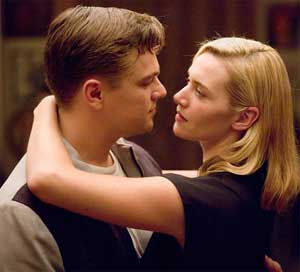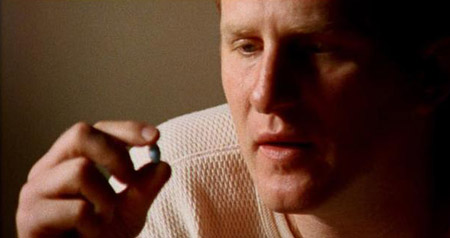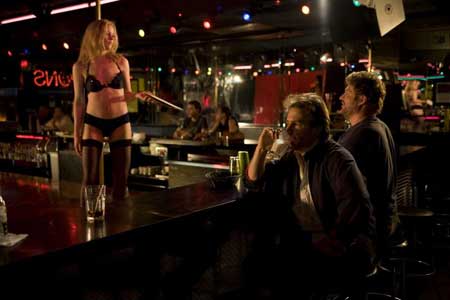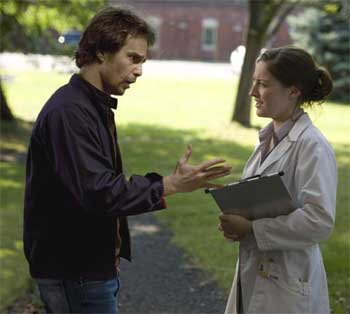
The critics were not happy during the screening. The critic to my left fell asleep in his chair for an hour. The critic to my right — a jovial man who really wanted to like it — gradually realized that this was a film impossible to come to terms with.
Gone were Eisner’s primary colors, replaced by muddy and amateurish black-and-white visuals with digitally added snow that never seemed to stick. The Spirit was so bad that it made Warren Beatty’s Dick Tracy look like a masterpiece.
Everyone was excited at the beginning, knowing that this was Will Eisner’s classic character finally brought to the screen and that it was Frank Miller who was going to steer it forward. But one of the fascinating aspects of this screening was observing the precise point in which each audience member would give up, knowing that Miller was cheapening a legend. Knowing that the film was wasting its cast and crew. Knowing that Miller was producing something even more odious than The Dark Knight Strikes Again or that crappy Robocop comic. (And let’s be honest. Has Miller truly contributed anything important to comics in the last ten years?) Knowing that it was Mr. Rodriquez who was the great force behind Sin City, and not Miller. (And to think that Rodriquez abandoned the DGA for this hack.) Knowing that just about everybody wanted to lock Miller into a room and punch him repeatedly in the face for about eight hours for producing this travesty. Knowing that something we all had hoped would be good was such a steaming turd.
I counted eight walkouts. There may have been more. But I can’t be sure. I was too busy slumping in my seat, stunned by the film’s relentless determination to sodomize Will Eisner’s corpse, assaulted by the film’s muddled script, which couldn’t even clear up the origin story until two-thirds of the way into the picture, its needless misogyny (women are either whores, nurturers, or kept in the background as laconic sidekicks), its inability to strike a single human note, and its failure to evince one note of fun.
Yes, Frank Miller should be punched in the face for this. It’s the only way to be sure.
There were jokes — one involving an ass on a copy machine — in which not a single person laughed. And again this was a friendly and rowdy crowd. But they all sunk into their chairs, feeling very angry that their time had been greatly wasted.
Oh, Stana Katic, how you tried as Morgenstern! You are as wonderful as Mageina Tovah, who played Ursula in the Spider-Man movies. I can now watch you in just about anything. And I feel so sorry for you for having your talent wasted. How much did you fight to keep the remainder of your quirks in? Bill Pope, I have admired your cinematography for quite a while. But this film was beneath your great talent and you should have known better. Samuel L. Jackson, signing on for a role just because you’re a geek simply isn’t worth it anymore.
Miller directs his cast as if they are statuary and handles his crew as if they are expected to generate magic simply by standing around. He is an ugly and crude man who does not know the human condition, and he is more interested in Eva Mendes’s ass than any innate personality she can use to sex up her role. He has tossed around crude pop culture references — including buildings and trucks named after Eisner’s collaborators — in an effort to win over the fanboys. But the fanboys will not bite. What Miller doesn’t understand is that geeks are too refined to swallow codswallop. What Miller doesn’t understand is that hell hath no greater fury than a fanboy spurned.
If there is any justice, the fanboys will lynch Miller at a future Comic-Con. If there is any justice, this film will fail at the box office and the money men will reconsider handing Miller the Buck Rogers reboot.
But there is rarely justice in Hollywood. The fact that this film was allowed to be made is testament to that.

 Instead of the backstories associated with this disastrous local theater run, we see Leo and Kate (certainly not anything close to Yates’s Frank and April, and considerably removed from Cameron’s Jack and Rose) looking across at each other at a party. But we have no real sense in the film of why these two would be attracted to each other, and, because of this, there’s no real reason to care. It doesn’t help that the Wheeler household looks more like a Pottery Barn catalog than a middle-class dwelling in 1955. And it doesn’t help that Mendes cannot even depict two pivotal acts of carnality with accuracy. (In the Mendes universe, couples have passionless sex and finish each other off in twenty seconds without even the tiniest whimper of pleasure. This is as preposterous and implausible as Sharon Stone’s over-the-top masturbation scene in Sliver. In a narrative that demands close verisimilitude, this is an inexcusable artistic decision.)
Instead of the backstories associated with this disastrous local theater run, we see Leo and Kate (certainly not anything close to Yates’s Frank and April, and considerably removed from Cameron’s Jack and Rose) looking across at each other at a party. But we have no real sense in the film of why these two would be attracted to each other, and, because of this, there’s no real reason to care. It doesn’t help that the Wheeler household looks more like a Pottery Barn catalog than a middle-class dwelling in 1955. And it doesn’t help that Mendes cannot even depict two pivotal acts of carnality with accuracy. (In the Mendes universe, couples have passionless sex and finish each other off in twenty seconds without even the tiniest whimper of pleasure. This is as preposterous and implausible as Sharon Stone’s over-the-top masturbation scene in Sliver. In a narrative that demands close verisimilitude, this is an inexcusable artistic decision.) Leonardo DiCaprio is not that man. He demonstrates little thespic understanding of what it means to be stifled. He gives us nothing in the way of sorrow, save the cartoonish wails and the exaggerated throwing of physical objects from surfaces. DiCaprio has been relying on this ever since a few people convinced him that he was a serious actor. But he is unable to present us with some of the reasons why Frank would be tempted by an extramarital affair. He can access the territory of knowing he’s not good enough to be someone special. But when we learn how Frank Wheeler’s cavalier act gets him ahead, it is not because of DiCaprio. It is because Haythe and Mendes spoon-feed it to us ad nauseum. A scene at a beach, a scene with his co-workers at a diner, a scene with April. This is an inefficient and an insulting waste of minutes. We need not be told twice, let alone three times, that Frank Wheeler has what it takes to get ahead at Knox Business Machines. It should be self-evident in the way that Frank Wheeler acts on screen. But DiCaprio here cannot merge into the tempo established by his environment.
Leonardo DiCaprio is not that man. He demonstrates little thespic understanding of what it means to be stifled. He gives us nothing in the way of sorrow, save the cartoonish wails and the exaggerated throwing of physical objects from surfaces. DiCaprio has been relying on this ever since a few people convinced him that he was a serious actor. But he is unable to present us with some of the reasons why Frank would be tempted by an extramarital affair. He can access the territory of knowing he’s not good enough to be someone special. But when we learn how Frank Wheeler’s cavalier act gets him ahead, it is not because of DiCaprio. It is because Haythe and Mendes spoon-feed it to us ad nauseum. A scene at a beach, a scene with his co-workers at a diner, a scene with April. This is an inefficient and an insulting waste of minutes. We need not be told twice, let alone three times, that Frank Wheeler has what it takes to get ahead at Knox Business Machines. It should be self-evident in the way that Frank Wheeler acts on screen. But DiCaprio here cannot merge into the tempo established by his environment. Instead, Mendes and Haythe, who appear to be a writer-director working team about as competent as Akiva Goldsman and Joel Schumacher, see Yates’s endlessly nuanced novel as an opportunity to remake American Beauty for the 1950s, with a number of sexist nods to Mad Men thrown in for commercial appeal. “I must scoot. Toodle-ooo,” says one bubbly neighbor. And this cornball emphasis suggests that Mendes and Haythe don’t see the 1950s as a time in which real people lived and wrestled with serious decision. It is a decade to be played merely for cheap laughs.
Instead, Mendes and Haythe, who appear to be a writer-director working team about as competent as Akiva Goldsman and Joel Schumacher, see Yates’s endlessly nuanced novel as an opportunity to remake American Beauty for the 1950s, with a number of sexist nods to Mad Men thrown in for commercial appeal. “I must scoot. Toodle-ooo,” says one bubbly neighbor. And this cornball emphasis suggests that Mendes and Haythe don’t see the 1950s as a time in which real people lived and wrestled with serious decision. It is a decade to be played merely for cheap laughs. 

 No Country for Old Men‘s Kelly Macdonald appears as Paige Marshall, whose eyes were seemingly invented for the light, but who we know, upon her character’s first step inside the mise en scene, will almost certainly become Victor’s love interest and will almost certainly never live up to
No Country for Old Men‘s Kelly Macdonald appears as Paige Marshall, whose eyes were seemingly invented for the light, but who we know, upon her character’s first step inside the mise en scene, will almost certainly become Victor’s love interest and will almost certainly never live up to  Gregg’s film does disguise New Jersey locations somewhat successfully as the Northwest. The apartments are laced with tacky wallpaper. There are many dead patches of lawn on the historical reenactment site. There are unwashed radiators, grimy kitchen surfaces, and photographs tacked carelessly to walls. But the film’s many flashbacks to the 1970s and 1980s, containing muted browns and the kind of predictable tan jackets and vests that have become something of a production design cliche, reveal that this is more kitsch than verisimilitude. More of a time capsule than a movie of the moment.
Gregg’s film does disguise New Jersey locations somewhat successfully as the Northwest. The apartments are laced with tacky wallpaper. There are many dead patches of lawn on the historical reenactment site. There are unwashed radiators, grimy kitchen surfaces, and photographs tacked carelessly to walls. But the film’s many flashbacks to the 1970s and 1980s, containing muted browns and the kind of predictable tan jackets and vests that have become something of a production design cliche, reveal that this is more kitsch than verisimilitude. More of a time capsule than a movie of the moment.